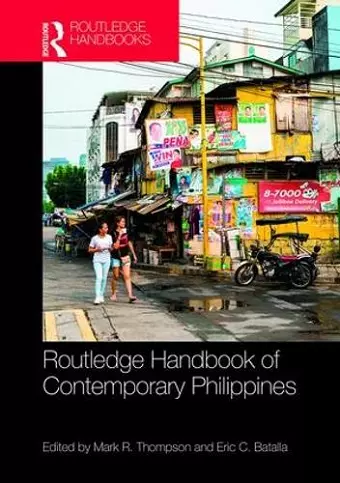Routledge Handbook of the Contemporary Philippines
Mark Thompson editor Eric Vincent Batalla editor
Format:Hardback
Publisher:Taylor & Francis Ltd
Published:5th Mar '18
Currently unavailable, and unfortunately no date known when it will be back
This hardback is available in another edition too:
- Paperback£45.99(9780367580827)

The Philippines is a fascinating example of a "poor country democracy" where issues of economic development and poverty, political participation and stability, as well as ethnicity and migration are crucial. The Routledge Handbook of the Contemporary Philippines provides a comprehensive overview of the current political, economic, social, and cultural issues of the country. The Handbook is divided into the following four sections concentrating on a different aspect of the Philippines:
- domestic politics;
- foreign relations;
- economics and social policy;
- cultures and movements.
In terms of domestic politics, chapters discuss clientelism, bossism, dynasties, pork barrel and corruption as well as institutions - the presidency, congress, the judiciary, the civil service, political parties, and civilian-military relations. The Philippines is confronted with many overseas challenges, with the foreign relations section focused on the country’s relationship with China, Japan, and the USA as well as assessing the impact of the Filipino diaspora community around the world. Regarding economics and social policy, authors examine industrial policy, capital flight, microfinance, technocracy, economic nationalism, poverty, social welfare programs, and livelihoods. The final section on Philippine cultures and movements highlights issues of customs, gender, religion, and nationalism while also examining various social and political forces - the peasantry, the middle class, indigenous peoples, NGOs, the left, trade unionism, the women’s movement, and major insurgencies.
Written by leading experts in the field, the Handbook provides students, scholars, and policymakers of Southeast Asia with an interdisciplinary resource on the evolving politics, society, and economics of the Philippines.
The book allows readers to enjoy a compilation of chapters written by scholars who have shaped the discourse of Philippine politics, economics, and civil society. Those who come from the complementary fields of history, economics, and sociology should consider this handbook as a good resource. The book provides useful material for understanding the persistence of political, social, and economic problems in the country. For those engaged in Southeast Asian studies, this volume is beneficial when thinking about the suitability of comparing cases in the region. The authors are scholars who have a deep knowledge in the study of the Philippines and have done comparative work as well. Covering domestic politics, foreign relations, economics and social policy, cultures, and movements the book delivers on its promise to look in to the contemporary challenges of the Philippines and its “troubled transition to democracy.” There is no doubt that the handbook serves as an excellent volume for Political Science students and academics. Cleo Calimbahin, Philippine Political Science Journal 40 (2019)
The Handbook proves itself a useful guide in chartering the situation of contemporary Philippine society, from the post-edsa period to the present. [...] The Handbook likewise provides an essential interdisciplinary guide for students, scholars and policymakers alike into the most central themes that have impact on Philippine society. [... ] The book forwards a comprehensive overview of contemporary Philippines’ domestic politics, foreign policy, economic and livelihood concerns, the cultural factors shaping its traditions in the modern period, and the social movements which changed the course of the country’s history. Maria Veronica M. Manalo, Philippine Political Science Journal 40 (2019)
ISBN: 9781138892347
Dimensions: unknown
Weight: 1050g
492 pages